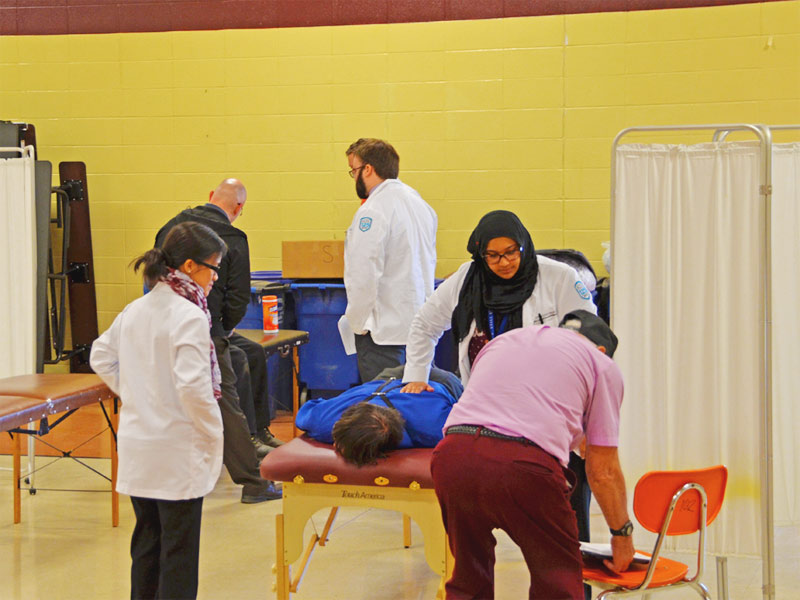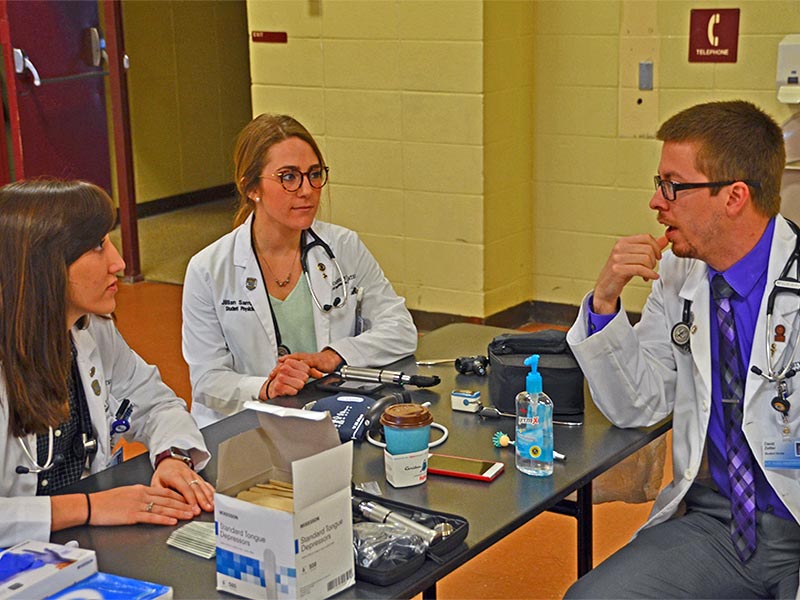Family Medicine Cares USA Supports Free Medical Clinics
Kirksville, Mo., Clinic Uses Grant to Serve Local Amish Community
April 19, 2018 12:54 pm Chris Crawford – The AAFP Foundation launched its Family Medicine Cares (FMC) USA program in 2011 to financially support free health clinics in the United States by providing grants to purchase tangible items such as exam tables, computers for electronic health record systems and medical equipment.

To date, the program has awarded grants of about $416,000 to 38 free clinics (14 new and 24 existing clinics) in 21 states, which it estimates has helped provide services worth more than $45 million to about 227,000 patients.
In 2017 alone, FMC USA-sponsored clinics reported having more than 3,100 volunteers, including medical students, family medicine residents, and active and retired family physicians.
FMC USA's support helped launch the Still Caring Health Connection-Volunteers in Medicine (SCHC-VIM) free clinic, which received about $22,000 from the program when it began in April 2015.
The SCHC-VIM program, which is affiliated with A.T. Still University's Kirksville College of Osteopathic Medicine (ATSU-KCOM) and Missouri School of Dentistry & Oral Health (ATSU-MOSDOH) in Kirksville, Mo., used its FMC USA grant to purchase hemoglobin A1c and lipid panel machines, portable osteopathic manipulative medicine tables, rotating stools, exam lights, weight scales, otoscopes and exam chairs, as well as stethoscopes, thermometers, penlights and blood pressure cuffs.
Still Caring
On a bitterly cold April day in Queen City, Mo., students from ATSU-KCOM and ATSU-MOSDOH set up shop in the gymnasium of Schuyler County R-1 High School for a health fair as part of the SCHC-VIM free clinic to treat underserved patients, primarily members of the nearby Amish community.
Robert Ring is a second-year osteopathic medical student at ATSU-KCOM from Sparta, Wis., and the rural outreach medical director of the SCHC-VIM club.
Story Highlights
Ring told AAFP News the free health fair offers participants a general health screening, including osteopathic manipulative treatments, as well as a dental screening from the dental students.
"It's just a really great learning experience for us," he said. "The clinical context is really helpful as we're learning medicine the first couple of years. It makes things meaningful to you -- being able to help the people who need it the most."
Ring said these regular free health clinics that serve the surrounding rural areas are especially helpful to Amish communities.
"Amish patients work very hard with their bodies and are involved in very physical labor," he said. "If they really have significant problems, our osteopathic treatments can offer very dramatic improvements."
The osteopathic medical students involved were supervised by their professors, including Andrew Lovy, D.O., an adjunct professor in the Department of Osteopathic Manipulative Medicine at ATSU.
"The nice thing about these events is that in class, the students learn the (osteopathic) techniques and perform them mostly on their classmates," he said. "Here, this is the real world. These are real patients with real problems that the students get to diagnose, and then under supervision, get to treat and help people get better."

One Amish patient from Greentop, Mo. -- about five miles south of the high school in Queen City -- said this is the third time he and his family have attended one of the SCHC-VIM free health fairs, and he really appreciated the osteopathic manipulations to relax his sore muscles.
The SCHC-VIM program also runs a monthly free clinic at ATSU's Gutensohn Clinic, where patients without health insurance can receive care. The group also can help patients pay for further referral services that might be required.
Roshni Joseph is a second-year dental student at ATSU-MOSDOH and the dental rural outreach coordinator who helps organize the SCHC-VIM free health fairs.
Joseph said many patients the dental team sees don't have the materials they need to brush or floss their teeth.
"So, we usually provide them with a lot of education on brushing and flossing and give them toothbrushes, toothpaste and floss," she said. "Additionally, we can give them a fluoride varnish to help prevent cavities."
Like the osteopathic medical students, the dental students at the health fair also were supervised by practicing dentists and dental hygienists who helped diagnose anything the students saw that raised concerns. The dental group also provides the patients with referral information for additional affordable dental care.
Ring said that participating in the SCHC-VIM program has been an amazing experience for him overall, especially treating the specific needs of Amish families.
One Amish mother, he said, complained about upper back pain and presented with her two-month-old infant.
"In exploring her history, she revealed that the family's horse had gotten sick and it had fallen to her to pull the wagon across the yard," Ring said. "We were able to provide osteopathic manipulative treatment to successfully relieve her back pain, but it was truly a lesson in history-taking that I will not forget. If you don't ask, you may never find out."
"Thanks again for FMC USA's generous support and the difference it's making for us medical students and the communities we serve," he concluded.
Supporting Family Medicine Cares USA
FMC USA is funded through donations from AAFP members and others who want to support the important work it does. Members can help by volunteering in these free clinics or making a donation.
In addition, new and existing free clinics can apply for a grant through FMC USA until Aug. 15 at 5 p.m. CT. Applicants must have an AAFP member in an active leadership role in the clinic.
Related AAFP News Coverage
The EveryONE Project Unveils Team-based Resources
AAFP's Signature Health Equity Initiative Continues to Evolve
(4/6/2018)
Leader Voices Blog: Don’t Forget Puerto Rico -- We Didn’t
(4/2/2018)
Report Shows Health Disparities by County, Demographics
(3/27/2018)
National Health Policy Conference
Keynote Spotlights Community Work on Social Determinants
(2/9/2018)